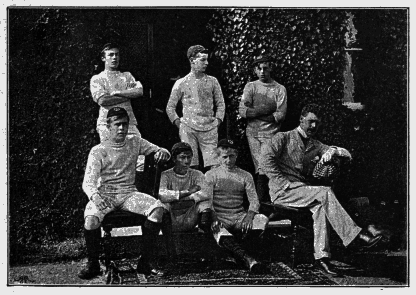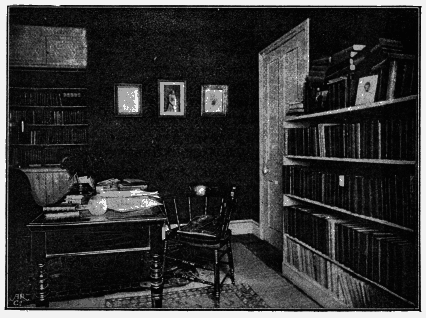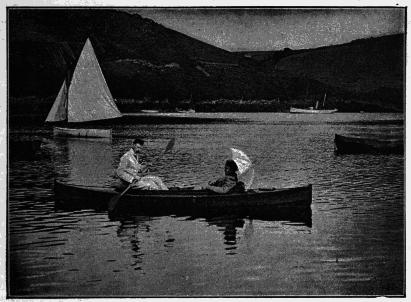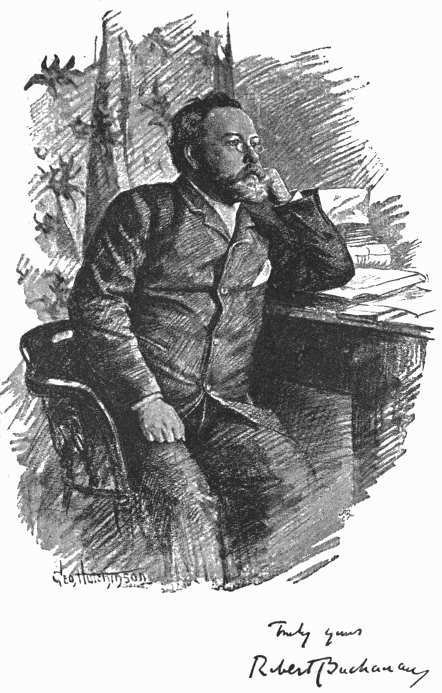My First Book, стр. 47

A travelling waxwork company was unpacking its caravan in the square outside my window on the morning when I pulled in my chair and light-heartedly wrote 'Dead Man's Rock (a Romance), by Q.,' at the top of the first sheet of foolscap. The initial was my old initial of the Oxford Magazine verses, and the title had been settled on for some time before. Staying with some friends on the Cornish coast, I had been taken to a picnic, or some similar function, on a beach, where they showed me a pillar-shaped rock, standing boldly up from the sands, and veined with curious red streaks resembling bloodstains. 'I want a story written about that rock,' a lady of the party had said; 'something really blood-thirsty. "Slaughter Rock" might do for the name.' But my title was really borrowed from the Dodman, locally called Deadman, a promontory east of Falmouth, between Veryan and St. Austell bays.
I had covered two pages of foolscap before the brass band of the waxwork show struck up and drove me out of doors and along the road that leads to the railway station—the only dull road around Petworth, and chosen now for that very reason. A good half of that morning's work was afterwards torn up; but I felt at the time that the enterprise was going well. I had written slowly, but easily; and, of course, believed that I had found my vocation, and would always be able to write easily—most vain delusion! For in six years and a half I have recaptured the fluency of that morning not half-a-dozen times. Still, I continued to take a lively interest in my story, and wrote at it very steadily, finishing Book I. before my return to Oxford. It surprised me, though, that, for all my interest in it, the story gave me little or no emotion. Once only did I get a genuine thrill, and that was at the point where young Jasper finds the sailor's cap (p. 25), and why at this point more than another is past explaining. In later efforts I have written several pages with a shaking pen and amid dismal signs of grief; and, on revision, have usually had to tear those pages up. On the whole, my short experience goes against
si vis me flere, dolendum est
Primum ipsi tibi.
But if on revision an author is moved to tears or laughter by any part of his work, then he may reckon pretty safely upon it, no matter with how stony a gravity it was written.

Book I.—just half the tale—was finished then, and put aside. The Oxford Michaelmas Term was beginning, and there were lectures to be prepared; but this was not all the reason. To tell the truth, I had wound up my story into a very pretty coil, and how to unwind it was past my contriving. When the book appeared, its critics agreed in pronouncing Part I. to be a deal better than Part II., and they were right; for Book II. is little more than a violent cutting of half-a-dozen knots that had been tied in the gayest of spirits; and it must be owned, moreover, that the long arm of coincidence was invoked to perform a great part of the cutting. For the time, however, the unfinished MS. lay in the drawer of my writing-table; and I went back to Virgil and Aristophanes and scribbled more verses for the Oxford Magazine. None of my friends knew at that time of my excursion into fiction; but one of them possesses the acutest eye in Oxford, and, with just a perceptible twinkle in it, he asked me suddenly, one evening towards the end of Term, if I had yet begun to write a novel. The shot was excellently fired, and I surrendered my MS. at once, the more gladly because believing in his judgment. Next morning he asserted that he had sat up half the night to read it. His look was of the freshest, but he came triumphantly out of cross-examination, and urged me to finish the story. In my elated mood I would have promised anything, and set to work at once to think out the rest of the plot; but it was not until the Easter Vacation that I finished the book, in a farmhouse at the head of Wastwater.
Another friend was with me, who, in the intervals of climbing, put all his enthusiasm into Aristotelian logic while I hammered away at the 'immortal product,' as we termed it by consent. It was further agreed that he should abstain from looking at a line of it until the whole was written—a compact which I have not heard he found any difficulty in keeping. Indeed, there was plenty to occupy us both without the book. Snow lay thick on the fells that spring, and the glissading was excellent; we had found, or thought we had, a new way up the Mickledore cliffs; and Mr. Gladstone had just introduced his first Home Rule Bill, and made the newspapers (which reached us a day late) very good reading. However, the MS. was finished and read with sincere, if discriminating, approval, on the eve of our departure.
The next step was to find a publisher. My earliest hopes had inclined upon my friend, Mr. Arrowsmith, of Bristol, who (I hoped) might remember me as having for a time edited the Cliftonian; but the book was clearly too long for his 'Railway Library,' and on this reflection I determined to try the publishers of 'Treasure Island.' Mr. Lyttelton Gell, of the Clarendon Press, was kind enough to provide a letter of introduction; the MS. went to Messrs. Cassell & Co., and I fear the end of my narrative must be even duller than the beginning. Messrs. Cassell accepted the book, and have published all its successors. The inference to be drawn from this is pleasant and obvious, and I shall be glad if my readers will draw it.

It is the rule, I find, to conclude such a confession as this with a paragraph or so in abuse of the literary calling; to parade one's self before the youth of merry England as the Spartans paraded their drunken Helot; to mourn the expense of energies that in any other profession would have fetched a nobler pecuniary return. I cannot do this; at any rate, I cannot do it yet. My calling ties me to no office stool, makes me no man's slave, compels me to no action that my soul condemns. It sets me free from town life, which I loathe, and allows me to breathe clean air, to exercise limbs as well as brain, to tread good turf and wake up every morning to the sound and smell of the sea and that wide prospect which to my eyes is the dearest on earth. All happiness must be purchased with a price, though people seldom recognise this; and part of the price is that, living thus, a man can never amass a fortune. But as it is extremely unlikely that I could have done this in any pursuit, I may claim to have the better of the bargain.
Certain gentlemen who have preceded me in this series have spoken of letters as of any ordinary characteristic pursuit. Naturally, therefore, they report unfavourably; but they seem to me to prove the obvious. Literature has her own pains, her own rewards; and it scarcely needs demonstration that one who can only bring to these a bagman's estimate had very much better be a bagman than an author.
'UNDERTONES' and 'IDYLS AND LEGENDS OF INVERBURN'
By Robert Buchanan

MY first serious effort in literature was what I may call a double-barrelled one; in other words, I was seriously engaged upon two books at the same time, and it was by the merest accident that they did not appear simultaneously. As it was, only a few months divided one from the other, and they are always, in my own mind, inseparable, or Siamese, twins. The book of poems called 'Undertones' was the one; the book of poems called 'Idyls and Legends of Inverburn' was the other. They were published nearly thirty years ago, when I was still a boy, and as they happened to bring me into connection, more or less intimately, with some of the leading spirits of the age, a few notes concerning them may be of interest.
